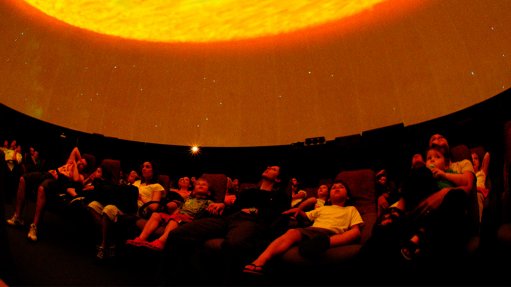
Cape Town’s much-loved Iziko Planetarium will undergo a thorough R27-million digital upgrade, culminating in a state-of-the-art digital full dome immersive theatre facility by early 2017.
In tune with the digital revolution, the Iziko Planetarium will migrate from analogue to full dome digital technology, which has become the norm for planetaria worldwide.
“High resolution multimedia image projection creates riveting immersive and multisensory experiences that virtually transport audiences. This innovative evolution is expected to create a hub of creativity and learning for the general public, as well as provide unparalleled educational and e-research benefits,” Iziko Museums CEO Rooksana Omar said at the launch of the digital upgrade project.
She said the new theatre would offer 360° edutainment and embodied a fundamental shift in the role of museums in contemporary society.
“Museums are no longer static, authoritarian spaces, but interactive, experiential spaces and centres of wonder and learning, which enable people to explore and see our world differently.”
A vital element of the upgrade is that researchers will be able to benefit greatly from the Iziko Planetarium.
“The Department of Science and Technology (DST) has invested in the upgrade of the full dome because it will further support the development of astronomy and ensure adequate infrastructure to allow for cross-cutting research across disciplines,” said the DST’s Dr Daniel Adams.
Students studying everything from astronomy and engineering to design, fine arts and archeology will have access to the infrastructure.
“By combining motion with three-dimensional (effectively simulating four-dimensional) [visuals], researchers can virtually ‘fly’ through multidimensional visualisations opening up a whole new avenue of exploration – from planetary and solar system science to geology, oceanography, climate and earth science, medical science, molecular- and biochemistry and even town planning,” said the Iziko Planetarium.
“[South African] universities look forward to working with Iziko to inspire the next generation of scientists,” said Professor Romeel Davé on behalf of the academic partners involved in the project – the University of the Western Cape (UWC) and Cape Peninsula University.
Professor Russ Taylor, the joint University of Cape Town, UWC, Square Kilometre Array (SKA) Research Chair, said he saw the digital upgrade as an opportunity for a new collaborative framework bringing together scientists, technologists and artists to help understand data.
“With this new system, we will be bringing big data and the scientific experience to a range of people. This could spark the imaginations of young people who will be the inheritors of the digital age. A hundred years from now, when historians look back at this age, they will see digital transformation as one of the fundamental drivers that changed the world and the way we work.”
The Iziko Planetarium will be closed during preparations for the upgrade. A digital projection system will replace the current projector, audio visual equipment and slide projectors, while the ‘star’ machine will be dismantled.
About 40 000 school learners visit the planetarium every year. The planetarium has held 45 000 shows and welcomed two-million visitors since it opened.